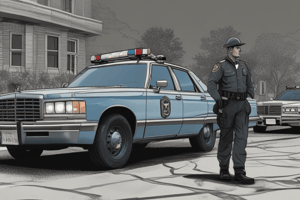Podcast
Questions and Answers
Who is responsible for providing notice to the member's family in case of line-of-duty death or critical injury?
Who is responsible for providing notice to the member's family in case of line-of-duty death or critical injury?
In the event of an on-duty death, the name of the affected member can be released to the media before notifying immediate family members.
In the event of an on-duty death, the name of the affected member can be released to the media before notifying immediate family members.
False (B)
What information should the Notification Officer gather before contacting family members?
What information should the Notification Officer gather before contacting family members?
A brief description of the incident/cause, location of death or injury, approximate time of death or injury, and disposition of personal property.
Study Notes
Line-of-Duty Death/Critical Injury Notifications
- Purpose: Establish procedures for notifying a member's family in the event of a line-of-duty death or critical injury.
Terminology
- Hospital Liaison Member: First supervisor to arrive at the hospital.
- Notification Officer: Designated by the Chief of Police or Bureau Commander, responsible for providing notice to the member's family.
Procedure
- Communication regarding notifications should be restricted to the telephone whenever possible.
- The name of the affected member must never be released to the media before immediate family members living in the region are notified.
Notification Officer Guidance
- Timeliness takes precedence over protocol in the notification process.
- Notification must always be made in person and never alone.
- A police chaplain and Chief of Police or designee shall accompany the Notification Officer.
- If a Police Chaplain is not available, a senior ranking member at the scene will designate another member to accompany the Notification Officer.
Gathering Information
- Notification Officer should gather the following information before contacting family members:
- Brief description of the incident/cause and location of death or injury.
- Approximate time of death or injury.
- Location of the affected member and disposition of their personal property.
Notification Officer Awareness
- Whenever the health of a family member is a concern, KCFD personnel shall be requested to stand-by at the location of notification.
- As soon as a family member sees the Notification Officer, they will know something is wrong.
- If the member has already died, relay that information using words like "died" and "dead", rather than "gone away".
- Notification Officer may be affected by the death and should understand that showing emotions is acceptable.
- Reactions of family members may include hysteria, anger, fainting, physical violence, denial, shock, etc.
Transportation and Care
- If the family member wants to go to the hospital, they should be transported via police vehicle.
- Young children or persons with special needs may be present, and the Department should be prepared to handle immediate care needs.
- Notification Officer should notify the senior ranking member at the hospital that the family is en route.
Family Assistance
- The family may request the assistance of a specific Department member to provide emotional support and aid with the family's understanding of Department procedures.
- Notification Officer will communicate this information to the senior ranking member as soon as possible.
Hospital Liaison Responsibilities
- Coordinate an area or room for immediate family members, the Chief of Police or designee, the Notification Officer, and only others requested by the immediate family members.
- Coordinate an area or room for fellow police members and friends.
- Coordinate a press staging area.
Studying That Suits You
Use AI to generate personalized quizzes and flashcards to suit your learning preferences.
Related Documents
Description
This quiz covers the procedures for notifying a police officer's family in the event of a line of duty death or critical injury.




